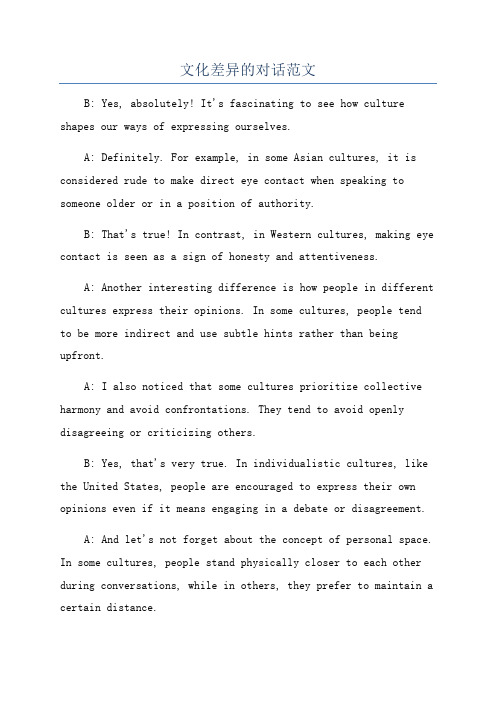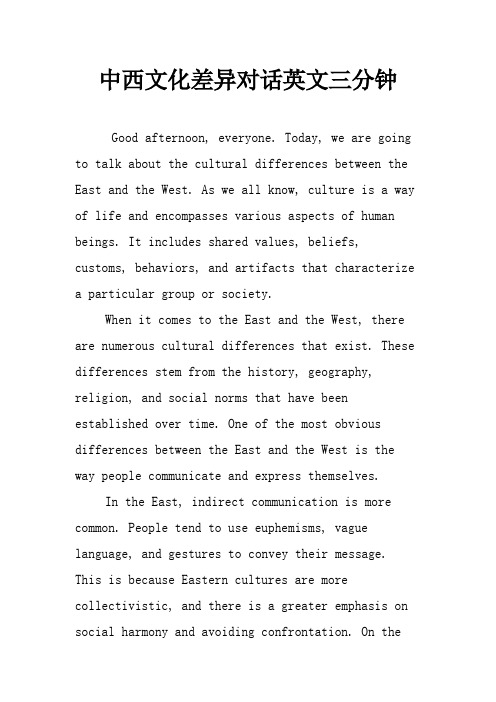中美文化差异口语对话
中美文化差异英文版

1.美国人的自我意识和独立意识很强。
Self-awareness and independent consciousness of Americans are very strong.2.美国文化鼓励人民开拓创新,做一番前人未做过的、杰出超凡的事业。
In America, innovation often is encouraged and people often do something nobody has done.3.美国基础教育实践,注重创造的教学形式.American education based on practice, pay attention to teaching form of creation.4. 中国的家庭结构比较复杂,传统的幸福家庭是四代同堂。
China's family structure is more complex, the traditional happy family is four generations.5. 中国人的婚姻相对来说比较稳定。
这是因为中国人把婚姻当作一个严肃的道德问题,喜新厌旧,或是第三者插足都会被认为是极不道德的。
The Chinese marriage is relatively stable. Because Chinese people treat marriage as a serious moral problem, propensity or a third people involvement is considered highly unethical.6. 新中国虽已建立了六十年,但传统的君臣,父子等级观念在中国人的头脑中仍然根深蒂固。
The traditional manner, parent-child hierarchical remains entrenched in the Chinese mind.7. 主动帮助别人或接受别人帮助在西方常是令人难堪的事。
英文中美文化差异对话作文

英文中美文化差异对话作文英文:A: Hi, how are you?B: I'm good, thanks. How about you?A: I'm doing well, thanks. So, I heard you just moved to the US from China. How are you adjusting to the cultural differences?B: It's been a bit of a challenge, to be honest. There are a lot of things that are different here compared to China. For example, the way people interact with each other is very different. In China, it's common to be more reserved and not show a lot of emotion, but here in the US, people are more open and expressive.A: Yeah, I can see how that would be a big adjustment. What else have you noticed?B: Well, there are also a lot of differences in the way people communicate. In China, it's very common to use indirect language and avoid confrontation, but here in the US, people are more direct and assertive. It's taken some getting used to.A: That makes sense. Have you had any specific experiences that really highlighted the cultural differences for you?B: Yeah, actually. I remember one time I was at a party and someone asked me what I thought of the food. In China, it's considered impolite to be too effusive with compliments, so I just said it was okay. But the person seemed offended and thought I didn't like it. I realized later that in the US, people expect you to be more enthusiastic and positive.中文:英文,嗨,你好吗?中文,我很好,谢谢。
关于中美礼仪文化差异的采访稿

关于中美礼仪文化差异的采访稿采访主题:中美礼仪文化差异采访对象:李先生(中国人,具有对外交流经验)和John先生(美国人,具有中国工作经验)采访时间:下午2点采访地点:李先生的办公室采访提纲:1. 首先,请问李先生和John先生在自己的文化中,礼仪的重要性是如何被看待的?2. 中美礼仪文化之间有什么差异?请分享一些例子。
3. 这些差异在实际生活和工作中是否会引发挑战?有哪些具体情况可以举例说明?4. 作为在对方文化中有一定工作经验的人,你们对于如何处理中美礼仪文化差异有什么建议?- 采访开始 -采访员:首先感谢你们接受采访,请给我们分享一下在你们各自的文化中,对礼仪的重要性是如何被看待的?李先生:在中国文化中,礼仪是非常重要的一部分,我们非常注重对他人的尊重和关心。
礼仪被看作是一种表达内心真诚的方式。
John先生:在美国,礼仪也很重要,但我觉得相对于中国来说,更注重个人的自由和个性表达。
礼貌和尊重也是重要的价值观。
采访员:中美礼仪文化之间有什么差异?可以举几个例子吗?李先生:在中国,我们通常会通过握手或鞠躬来问候他人,尤其是在正式场合。
而在美国,大多数人会倾向于使用握手,并且握手的力度较大。
John先生:是的,对于我们来说,握手经常是问候的方式,较少使用鞠躬。
另外,例如在用餐时,中国文化中我们鼓励用筷子,而在美国自由使用刀叉。
采访员:这些差异在实际生活和工作中是否会引发挑战?可以举几个具体情况说明吗?李先生:当中国人在美国进行商务会议时,有时候我们的人际交往方式可能会被误解为缺乏自信或者不够直接,因为我们通常会使用鞠躬等方式表达尊重。
John先生:是的,我在中国工作时曾经遇到过一些困惑。
例如,当我第一次去中国并与中国同事进行洽谈时,我觉得我们的直接表达方式有时候可能会让人感到冒犯。
采访员:作为在对方文化中有一定工作经验的人,你们对于如何处理中美礼仪文化差异有什么建议?李先生:我觉得双方都应该尽量了解对方的文化差异,并且保持尊重和开放的态度。
文化差异的对话范文

文化差异的对话范文B: Yes, absolutely! It's fascinating to see how culture shapes our ways of expressing ourselves.A: Definitely. For example, in some Asian cultures, it is considered rude to make direct eye contact when speaking to someone older or in a position of authority.B: That's true! In contrast, in Western cultures, making eye contact is seen as a sign of honesty and attentiveness.A: Another interesting difference is how people in different cultures express their opinions. In some cultures, people tendto be more indirect and use subtle hints rather than being upfront.A: I also noticed that some cultures prioritize collective harmony and avoid confrontations. They tend to avoid openly disagreeing or criticizing others.B: Yes, that's very true. In individualistic cultures, like the United States, people are encouraged to express their own opinions even if it means engaging in a debate or disagreement.A: And let's not forget about the concept of personal space. In some cultures, people stand physically closer to each other during conversations, while in others, they prefer to maintain a certain distance.B: Absolutely! In crowded countries like India or China, personal space is often limited, and people are used to being in close proximity. On the other hand, in Scandinavian countries, people prefer a larger personal space.B: That's a great point. In some cultures, nodding can indicate agreement, while in others, it is a sign of understanding or respect.A: Exactly! It's crucial to be aware of these cultural differences to avoid misunderstandings and misinterpretations.A: Absolutely. By appreciating and respecting cultural differences, we can bridge the gap between different cultures and create a more inclusive and harmonious world.B: That's the ultimate goal! Together, we can learn from each other and celebrate our unique cultural identities while promoting understanding and cooperation.A: Absolutely! Our cultural differences should be viewed as a rich tapestry that enhances our interactions and brings us closer together.B: I couldn't agree more! Let's continue to embracediversity and learn from each other's perspectives.A: Indeed. It's through dialogue and open-mindedness that we can break down the barriers caused by cultural differences and build a more connected world.B: Well said! I'm glad we had this conversation, and it's a reminder of the importance of respecting and understanding different cultures in our daily interactions.。
中美日三国文化差异英语对话

C:你们觉得在中美日三个国家中,最大的文化差异是什么?What do you think is the biggest cultural difference among China, the US and Japan?Q:我觉得最大的差异是对时间的看法。
在美国,大家都很注重时间,如果你迟到了,会被认为是不尊重别人的表现。
I think the biggest difference is the view of time. In America, everyone pays great attention to time. If you are late, it will be considered as disrespect for others' performance.C:哦,那在中国,虽然我们也注重时间,但是晚到一些并不会被认为是不礼貌。
Oh, that's in China. Although we also pay attention to time, it won't be considered impolite to be late.Q:对了,还有一个很大的差异就是饮食文化。
在美国,我们很喜欢吃快餐,因为快餐非常方便。
By the way, there is another big difference: food culture. In America, we like fast food very much because it is very convenient.Q:而在日本,我们非常注重饮食的品质和营养。
我们认为吃得好对我们的健康非常重要。
In Japan, we pay great attention to the quality and nutrition of diet. We think eating well is very important for our health.C:在中国,我们也很注重饮食的品质和营养。
文化差异与交流口语对话

文化差异与交流口语对话口语对话一:文化差异引发的误解A: Hey, have you noticed that our new colleague, Mike, seems kind of reserved?B: Yeah, I've noticed that too. I think it might be because he comes from a different culture.A: You're right. I heard he's from Japan. Maybe their cultural norms dictate that they are more reserved in social situations.B: That makes sense. I think it's important for us to be aware of these cultural differences and not misinterpret his behavior as being unfriendly.口语对话二:礼貌与尊重的差异A: I had an interesting experience last week when I went to a meeting with our clients from China.B: What happened?A: Well, at the end of the meeting, I extended my hand to shake hands with them, but they didn't reciprocate.B: That must have been awkward. Did you find out why they didn't shake hands?A: Yes, later on, I learned that in some Chinese cultures, physical contact, especially with someone of higher status, is not common in business settings. They view it as a sign of respect.B: That's good to know. It's always important to be aware of these cultural differences to avoid misunderstandings.口语对话三:交际方式的不同A: I've noticed that people from Western cultures tend to be more direct in their communication style.B: Yeah, they usually say what they mean without beating around the bush.A: Exactly. On the other hand, people from Asian cultures, such as Japan or Korea, tend to use more indirect communication. They often imply or suggest things instead of stating them directly.B: That's interesting. It must take some time to get used to those subtle cultural cues.A: Definitely. It's important to be patient and open-minded when interacting with people from different cultural backgrounds.口语对话四:语言和文化的密切联系A: I find it fascinating how language and culture are deeply intertwined.B: Yes, they are closely connected. The way we express our thoughts and feelings is shaped by our cultural upbringing.A: Have you ever experienced any language barriers when trying to communicate with people from different cultures?B: Definitely. It can be challenging when there are no direct translations for certain words or sayings in another language. It requires creativity and adaptability to overcome these language barriers.A: I agree. It's important to be patient and understanding when communicating with people who are not native speakers of your language.口语对话五:跨文化交流的重要性A: I think cross-cultural communication skills are becoming increasingly important in today's globalized world.B: I couldn't agree more. With the rise of international business and travel, understanding and respecting cultural differences is essential for successful communication.A: Absolutely. It not only helps us avoid misunderstandings but also fosters empathy and tolerance towards other cultures and perspectives.B: Exactly. Embracing diversity and promoting cultural exchange can lead to more harmonious and productive relationships between people from different cultures.A: Well said. Let's continue to learn and grow in our cross-cultural communication skills.总结:文化差异对口语交流产生了重要影响。
中西文化差异对话英文三分钟

中西文化差异对话英文三分钟Good afternoon, everyone. Today, we are going to talk about the cultural differences between the East and the West. As we all know, culture is a way of life and encompasses various aspects of human beings. It includes shared values, beliefs, customs, behaviors, and artifacts that characterize a particular group or society.When it comes to the East and the West, there are numerous cultural differences that exist. These differences stem from the history, geography, religion, and social norms that have been established over time. One of the most obvious differences between the East and the West is the way people communicate and express themselves.In the East, indirect communication is more common. People tend to use euphemisms, vague language, and gestures to convey their message. This is because Eastern cultures are more collectivistic, and there is a greater emphasis on social harmony and avoiding confrontation. On theother hand, in the West, direct communication is the norm. People are more likely to speak their minds and be straightforward with their opinions. They value individualism and the right to express oneself freely.Another cultural difference is in the concept of time. In the West, time is often viewed as a finite resource that must be managed efficiently. People are expected to be punctual and to use their time wisely. In the East, time is more fluid, and there is a greater emphasis on relationships and social activities. People are more likely to arrive late to appointments and spend time socializing with friends and family.Religious beliefs also differ between the two cultures. In the West, Christianity is the predominant religion, with its emphasis on forgiveness and redemption. In the East, religions such as Buddhism and Taoism focus on achieving inner peace and harmony with nature. Thesereligious beliefs have a significant impact on the way people view the world and their place in it.In conclusion, the cultural differences between the East and the West are vast and multifaceted. They influence how people communicate, view time, and approach life's challenges. Understanding these differences is crucial for effective communication and building strong relationships between individuals and cultures. By learning about each other's cultures and values, we can create a more inclusive and diverse world. Thank you.。
中西文化差异对话4人

中西文化差异对话4人中西文化差异对话4人一、引言中西文化差异是指中国文化和西方文化在价值观、行为方式、社会习俗等方面存在的差异。
由于历史、地理、宗教等因素的影响,中西方文化在很多方面有着明显的区别。
本对话将以4个角色为例,分别是中国人A、中国人B、西方人C和西方人D,通过他们之间的对话来探讨中西文化差异。
二、家庭观念A:你好,我是中国人A。
在中国,家庭观念非常重要。
我们通常会尊敬长辈,并把家庭放在首位。
C:你好,我是西方人C。
在西方国家,我们也重视家庭关系,但更注重个人独立和自由。
B:我同意C说的。
在中国,孝顺父母被认为是一种美德,而在西方国家,年轻人更倾向于独立生活。
D:确实如此。
在我们的文化中,个体权利和自主性被视为非常重要的价值观。
三、社交礼仪A:在中国,我们非常注重社交礼仪。
在见到长辈时要行鞠躬礼,而在西方国家,握手是常见的问候方式。
C:是的,在西方国家,握手通常被认为是友好和尊重的表达方式。
我们也会互相问候并交换名片。
B:在中国,我们还注重面子和尊重他人的感受。
我们通常会避免直接拒绝别人的请求。
D:在西方文化中,直接表达自己的意见被认为是诚实和直接的行为。
我们更注重个人权利和自由。
四、时间观念A:在中国,准时被视为一种尊重他人的行为。
我们通常会提前到达约定地点。
C:在西方国家,准时也被看作是尊重对方的表现。
但有时候会有一些灵活性,例如晚到几分钟可能不会被认为是不礼貌。
B:在中国,我们通常会安排时间来与朋友和家人聚会,并且经常提前预订餐厅等场所。
D:在西方文化中,时间更加灵活。
我们更注重自由安排时间,并且可能更喜欢即兴决定去哪里吃饭或做什么活动。
五、饮食习惯A:中国人非常注重饮食,我们有着丰富的烹饪技巧和传统菜肴。
C:在西方国家,我们也有各种美食,但西方人更注重快捷和方便的饮食方式。
B:在中国,我们通常会与家人或朋友一起用餐,并且经常会点多个菜来分享。
D:在西方文化中,个人主义较为突出。
- 1、下载文档前请自行甄别文档内容的完整性,平台不提供额外的编辑、内容补充、找答案等附加服务。
- 2、"仅部分预览"的文档,不可在线预览部分如存在完整性等问题,可反馈申请退款(可完整预览的文档不适用该条件!)。
- 3、如文档侵犯您的权益,请联系客服反馈,我们会尽快为您处理(人工客服工作时间:9:00-18:30)。
中美文化差异口语对话
A: Hey, have you noticed any cultural differences between China and the United States?
B: Yeah, there are quite a few differences. For example, in China, it's common to address someone by their title or surname, while in the U.S., people often use first names.
A: That's true. Also, personal space is something I've noticed. Americans tend to appreciate more personal space compared to Chinese people.
B: Absolutely. Another thing is that punctuality is highly valued in the U.S., whereas in China, it's somewhat more acceptable to be a little late for social gatherings.
A: Yes, and the concept of individualism versus collectivism is also quite different. Americans tend to emphasize individual rights and independence, while Chinese culture values collective harmony and group cohesion.
B: Very true. Additionally, communication styles differ. In China, indirect communication and saving face are important, so people often use implicit language to convey their messages. In the U.S., direct and straightforward communication is more common.
A: Right, and gestures can mean different things too. For
example, nodding the head up and down means "yes" in the U.S., but in China, it can indicate understanding or respect rather than agreement.
B: Definitely. It's fascinating to observe and learn about these cultural differences. They enrich our understanding of each other's backgrounds and help us navigate cross-cultural interactions with greater sensitivity.
A: Absolutely. It's important to approach cultural differences with an open mind and a willingness to learn from one another. It makes for more effective communication and fosters mutual respect and understanding.
B: I completely agree. Embracing and celebrating cultural diversity can lead to meaningful cross-cultural exchanges and opportunities for growth.。
